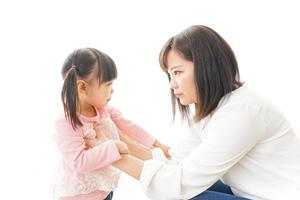Many people, Super Nanny included, believe children should be made to apologise after they have hurt someone or behaved rudely. I’m not sure I agree.
In the Super nanny version of parenting, children who have done the wrong thing come out from time-out or away from the ‘naughty chair’ and are made to say ‘sorry’ to those they have offended. I expect Super Nanny and others in favour of the immediate apology want to make the child more aware of the impact of their actions on others so that the child will not act that way. However, a badly timed and forced apology is just as likely to result in a child feeling confusion and shame rather than a sense of remorse and change in future behaviour.
Here’s the problem. Whenever any of us gets angry or frustrated, the emotional response goes hand-in-hand with a physiological one. That is, adrenalin pumps through our body when we encounter a threat or insult. As adults, we can sometimes deal with this response by overriding the physiological with the intellectual. For example, if you are driving in heavy traffic and someone cuts in front of you, you might remain calm and note that there are many poor drivers on the road. On another occasion, this same event might induce road rage in the driver who allows himself to be overwhelmed by his physiological reaction.
In his research in this area, John Gottman has discovered not only that men and women react differently to stress but that they have different rates of physiological recovery. Gottman suggests that in 85% of cases of conflict between women and men, women got upset more quickly and sometimes more acutely than men. However, women also recovered their equilibrium more quickly; that is, their heart rate returned to normal sooner and their levels of adrenalin fell more quickly. Men tended to defer their emotional response (called stonewalling), but once their emotions were elevated, they recovered more slowly from the physiological arousal. Sometimes, it could take hours for this physiological recovery to occur.
So how does this research impact on our thinking about children and their behaviour?
Children who have become upset because of parents’ attempts to limit their behavior or because of some interaction that has lead to the parents’ response (for example, seven year old Jack hitting his five year old sister because she has knocked down his Lego building) are physiologically aroused. While time out might provide an opportunity for the child to calm down, there is a fair chance that a few minutes away from the place of the stressful event is not going to be enough for the child’s physiological state to be returned to normal. If we then make Jack come out of time out and apologise to his sister while he is still feeling angry we are expecting him to override his emotion (in this case, anger) in a way that may not be possible for him at his age.
Furthermore, our expectations that he feel contrite and ‘sorry’ would conflict with his anger and create a tension in his emotions which may lead him to feel ashamed of his anger and resentful at being asked to apologise.
There is growing evidence that children need to be able to recognise and accept their emotions before they can learn to harness or manage them. This process, according to Daniel Goleman, is hierarchical. That is, first a child needs to be able to identify emotion before they can learn to track or manage them. Forced apologies made while emotions are still running high create confusion in the child about what it is they are feeling. It may lead them to distrust their emotions and one thing’s for sure: it will not help them with the skill of learning what to name their emotion.
Sometimes parents might assist the child to regain his or her emotional equilibrium by naming the emotion that led to the child’s negative behavior. For example, ‘Jack, you must have felt really angry when your sister knocked your building down after you had put so much effort into it.’ This response, from the parent, allows the child to recognise that his emotions are real and not a cause for shame. It’s the proverbial calling a spade a spade and it is an attuned response which acknowledges the child’s emotion without saying you condone what he did.
However, if an apology is called for, it needs to be done at the right time. The key issue here is about when the request for the apology should be made. If a parent asks the child to apologise too soon, when the child is still physiologically aroused and still feeling angry or upset, not only will the apology be insincere but the child hasn’t had an opportunity to grapple with their emotions and work through what they are feeling. Apologising when the anger is high tells the child that they are wrong to be angry.
Some children use apologising to their parents as a way of getting their parents to back off and for lessening the predicted emotional outburst by the parent. However, if the apology isn’t accompanied by some change in the child’s behavior, then it may not be a genuine apology. In these cases, parents should acknowledge the child’s intention to apologise, but remind him or her that a true apology means an attempt to change the hurtful or undesirable behavior.
A request for an apology and any discussion about why a behavior is hurtful or unacceptable needs to ideally take place at a time when the child is calm and able to really listen. This may be hours or even days after the event. Jack’s parents may say to him, ‘You know when you hit your sister yesterday, well, we don’t think that’s OK. It really hurt her. We know you felt angry because she broke your building, but it’s not OK to hit her. Do you think you could tell her you are sorry that you hit her?’
This way the situation does not remain unaddressed, but the teaching occurs out of the emotional heat of the event. In this way, a child has the chance to experience and grapple with emotions without them being labeled ‘wrong’ or ‘bad’, he or she can also be taught about the social and moral behaviours that will allow him or her to make better judgments later in life.
By Michael Hawton MAPS


